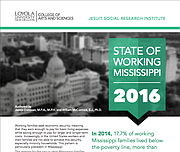Friday, September 23, 2016
The State of Working Mississippi 2016 report shows that Mississippi’s school system is divided in two: underfunded public schools and private schools. Photo courtesy Flickr/Bill McChesney
JACKSON — Mississippians in the highest income-tax brackets have enjoyed the limited economic growth the state has seen since the Great Recession, according to a recent report by Loyola University in New Orleans.
“Those people are primarily white and primarily live in urban areas,” Jeanie Donovan, an economic policy specialist who worked on the report, told the Jackson Free Press.
That disparity has a direct effect on education.
“This is the hard part about the cyclical nature of poverty,” she said. “Because the school systems are so tied to local property values and local property taxes, where those people who are making more money are living have better (public) schools—or if they don’t, they have enough money to send [their children] to the parallel private school system.”
The report, called “The State of of Working Mississippi 2016,” uses federal- and state-level data to assess the Mississippi’s labor force, employment, jobs and educational attainment.
The report states plainly that Mississippi has two school systems: “underfunded public schools for the poor and private schools for the wealthy.”
Donovan said that tying local school funding to property values is a common practice across the nation, but the difference in Mississippi is the state's level of investment in public education.
Mississippi ranks 10th nationally in federal funding per pupil, but ranks 47th in state funding, based on the 2014 data used in the report. Donovan said that some states address funding gaps in low property-value districts using a “Recapture” or “Robin Hood” policy, which takes some of the extra money from high property-value districts and gives it to struggling districts. Texas has implemented a Robin Hood policy, Donovan said, but not without controversy.
Metropolitan regions have recovered more successfully from the Recession than rural areas, the report shows, and schools in those areas have benefited.
Conversely, in more rural areas of the state where parents earn less money and property values are lower, public school systems are worse. This, in turn, leads to poorer educational outcomes and children in those areas growing up and earning less, Donovan said.
The report suggests several equitable strategies to help address low-wage jobs, unemployment and educational attainment statewide. Donovan said Mississippi could introduce a state earned-income tax credit, in order to boost low- and middle-income households and encourage participation in the workforce.
“(It’s) something that Louisiana has done and other states have been done in a bi-partisan way, where you give a little bit of money back to working families,” she said. “It incentivizes people to work.”
The report also points to the state's racial imbalances in employment. Nationally and especially in Mississippi, African Americans suffer from unemployment rates much higher than whites. The gap in the unemployment rate between African Americans and whites in Mississippi hovers around 5 percent.

